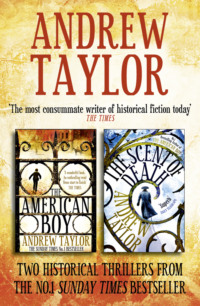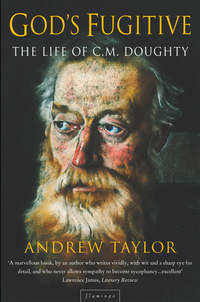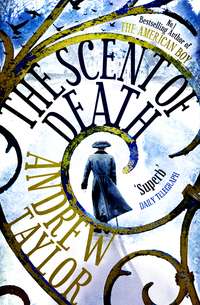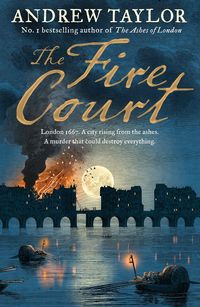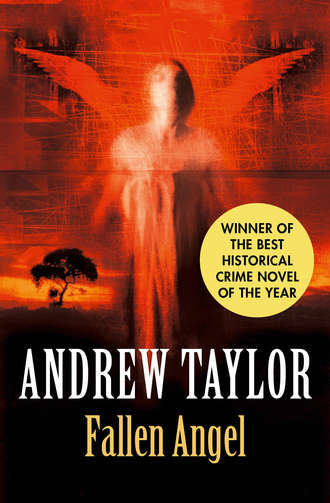
Полная версия
Fallen Angel
To make matters worse, he wasn’t sure what Angel was really doing down there. The soundproofing made eavesdropping impossible. After a while, Eddie unlocked the back door and went into the garden.
It was much colder today. The damp, raw air hurt his throat. He could not be bothered to fetch a coat. He walked warily down to the long, double-glazed window of the basement. As he had feared, the curtains were drawn. The disappointment brought tears into his eyes. His skin was burning hot. He leant his forehead against the cool glass.
The movement brought his head closer to the side of the window. There was a half-inch gap between the frame and the side of the curtains.
Scarcely daring to breathe, he knelt down on the concrete path and peered through the gap. At first he saw nothing but carpet and bare, white wall. He shifted his position. Part of the Victorian armchair slid into his range of vision. Lucy was sitting there. All he could see was her feet and ankles, Mickey Mouse slippers and pale-green tights, projecting from the seat. She was not moving. He wondered if she were sleeping. She had seemed very tired in the bath, perhaps because of the medication.
At that moment Angel came into view, still wearing her white robe. Round her neck was a long, purple scarf, like a broad, shiny ribbon with tassels on the end. Her eyes were closed and her lips were moving. As Eddie watched, she raised her arms towards the ceiling. Eddie licked dry lips. What he could see through the gap, the cross section of the basement, seemed only marginally connected with reality; it belonged in a dream.
Angel moved out of sight. Eddie panicked. She might have seen him at the window. In a moment the back door would open and she would catch him peeping. I just came out for a breath of fresh air. He straightened up quickly and glanced around. There was enough wind to stir the trees at the bottom of the garden and in Carver’s beyond. The leafless branches made a black tracery, through which he glimpsed Mrs Reynolds on her balcony. Eddie shivered as he walked back to the house.
Mrs Reynolds watches me, I watch Angel: who watches Mrs Reynolds? Must be God.
Eddie giggled, imagining God following Mrs Reynolds’s movements through a pair of field glasses from some vantage point in the sky. According to Mr Reynolds, his wife had become a born-again Christian since Jenny Wren had sent herself into a coma.
‘It’s a comfort to her,’ Mr Reynolds had said. ‘Not really my cup of tea, but never mind.’
Eddie opened the back door and went inside. The warmth of the kitchen enveloped him but he could not stop shivering. He went into the hall. The basement door was still closed. He pressed his ear against one of the panels. All he heard was his own breathing, which seemed unnaturally loud.
Clinging to the banister, he climbed the stairs and rummaged in the bathroom cupboard until he found the thermometer. He perched uncomfortably on the side of the bath while he took his temperature. It’s not fair. Why won’t she let me in the basement too? He took the thermometer out of his mouth. His temperature was over 102 degrees. He felt strangely proud of this achievement: he must be really ill. He deserved special treatment.
He found some paracetamol in the cupboard, took two tablets out of the bottle and snapped them in half. He poured water into a green plastic beaker which he had had since he was a child. The flowing water so fascinated him that he let it flood over the rim of the beaker and trickle over his fingers. At last he swallowed the tablets and went into his bedroom to lie down.
Alternately hot and cold, he lay fully clothed under the duvet. He thought how nice it would be if Angel and Lucy brought him a hot-water bottle and a cooling drink. They could sit with him for a while, and perhaps Angel would read a story. Nobody cares about me. He stared at the picture of the little girl which his father had given his mother all those years ago. Very nice, Stanley. If you like that sort of thing. A little later he heard his parents talking: dead voices from the big front bedroom; perhaps they were not really dead after all – perhaps they were watching him now.
Eddie drifted in and out of sleep. Just before three in the afternoon he woke to find his mouth dry and his body wet with sweat. He dragged himself out of bed and stood swaying and shivering in the bedroom. I need some tea, a nice cup of tea.
He found his glasses and went slowly downstairs. To his surprise, he heard voices in the kitchen. He pushed open the door. Lucy was sitting at the table eating a boiled egg. Angel was now dressed in jeans and jersey; her hair was tied back in a ponytail. As Eddie staggered into the room, he heard Lucy saying, ‘Mummy always cuts my toast into soldiers, but Daddy doesn’t bother.’
She stopped talking as soon as she saw Eddie. Angel and Lucy stared at Eddie. Two’s company, three’s none.
‘What are you doing in the kitchen?’ Eddie said, his voice rising in pitch. ‘It’s against the rules.’
‘The rules aren’t written in stone. Circumstances alter cases.’ Angel stroked Lucy’s dark head. ‘And this is a very special little circumstance.’
‘But they never come in the kitchen.’
‘That’s enough, Eddie. How are you feeling?’
Thrown off balance, he stared at her.
‘Cat got your tongue?’
‘How did you know I’m ill?’
‘You should try looking at yourself in the mirror,’ Angel said, not unkindly.
‘I think it’s flu.’
‘I doubt it: probably just a virus. You need paracetamol and lots of fluids.’
Eddie sat down at the table. Lucy looked at him, her spoon halfway to her mouth, and to his delight she smiled.
‘Finish your egg, dear,’ Angel said. ‘It’s getting cold.’
‘I don’t want any more.’
‘Nonsense. You need some food in that little tummy. And don’t forget your Ribena.’
Lucy dropped her spoon on the table. ‘But I’ve had enough.’
‘Come along: eat up.’
‘I’m full.’
‘You’ll do as I say, Lucy. You must always finish what’s on your plate.’
‘Mummy doesn’t make me when I’m full.’ Lucy’s eyes brimmed with tears but her voice was loud so she sounded more angry than afraid. ‘I want Mummy.’
‘We’re not at home to Miss Crosspatch,’ Angel announced.
Eddie laughed. He would not usually have dared to laugh, but now the boundaries were shifting. After all, he was not entirely sure that this was really happening. It might be a dream. At any moment he might wake up and see, hanging on the wall by the door, the picture of the little girl which his father had given his mother. The girl like Lucy.
‘You’re really not yourself, Eddie.’ Angel walked into the hall. ‘I’m going to take your temperature.’ Her footsteps ran lightly up the stairs.
Lucy pushed the toast aside with a violent movement of her right arm. The far side of the plate caught the plastic cup, which slid to the edge of the table. Ribena flooded across the floor.
For an instant, Eddie and Lucy looked at each other. Then Lucy slithered off her seat and ran for the door – not the door to the hall but the door to the garden. Eddie knew he should do something, if this were not a dream, but he wasn’t sure he would be able to stand up. In any case, it wouldn’t matter: they kept the back door locked when they had a little girl staying with them.
He watched Lucy twisting the handle and pulling. He watched the door opening and felt cold air against his skin. Only then, as Lucy ran into the garden, did he realize that she really was outside. He was aware, too, that this was his fault – that he had unlocked the door when he went out to look through the basement window at Angel and Lucy. Seeing Mrs Reynolds on her balcony had made him forget to relock it when he came in. Angel would blame him, which was unfair: it was Mrs Reynolds’s fault. He stood up, propping himself on the table.
Angel took him by surprise. She ran across the kitchen from the hall, the ponytail bouncing behind her, and out of the back door. Eddie heard a crack like an exploding firework. There was another crack, then a pregnant silence, the peace before the storm. He let himself sink back on to his chair.
It was almost a relief when Lucy began to cry: jagged sobs, not far from hysteria. Angel dragged her inside, kicked the door shut and turned the key in the lock. Angel was pale and tight-lipped.
‘Very well, madam.’ Angel was holding Lucy by the ear, her nails biting in to the pink skin. ‘Do you know what happens to naughty children? They go to hell.’
Eddie cleared his throat. ‘In a way, it’s not her fault. She’s –’
‘Of course it’s her fault.’
Lucy pressed her hand against her left cheek. The sobbing mutated into a thin, high wail.
‘Perhaps she’s tired,’ Eddie muttered. ‘Perhaps she needs a rest.’
Angel pushed Lucy away. The girl fell against a chair and slid to the floor. She stayed there, half-sitting, half-sprawling, with an arm hooked round a chair leg and her head resting against the side of the seat. Ribena soaked into the skirt of her dress.
The crying stopped. Lucy’s mouth hung open, the lips moist and loose. Fear makes children ugly.
‘It’s all right, Lucy.’ Eddie sat down on the chair beside hers and patted Lucy’s dark head. She jerked it away. ‘You’re a bit overexcited. That’s all it is.’
‘That’s not all it is.’ Angel tugged open the drawer where they kept the kitchen cutlery. ‘She needs a lesson. They all need a lesson.’
Eddie rubbed his aching forehead. ‘Who need a lesson? I don’t understand.’
Angel whirled round. In her hand was a pair of long scissors with orange plastic handles. She pointed them at Eddie, and the blades flashed. ‘You’ll never understand. You’re too stupid.’
He looked at the table and noticed the swirl of the grain around a knot shaped like a snail. He wished he were dead.
‘If they do wrong,’ Angel shouted, ‘they have to pay for it. How else can they make things right?’
Eddie examined the snail. He wanted to say: But she only spilled some Ribena.
‘And if they don’t want to, then I shall make them.’ Angel’s face was ablaze. ‘We all have to suffer. So why shouldn’t they?’
But who are ‘they’? The four girls or –
‘Come here, Lucy,’ Angel said softly.
Lucy didn’t move.
Angel sprang across the kitchen, the scissors raised in her right hand.
‘No,’ Eddie said, trying to get up. ‘You mustn’t.’
With her left hand, Angel seized Lucy by the hair and dragged her to her feet. Lucy screamed. Oddly detached, Eddie noticed that there were toast crumbs and a long stain of yolk on the green Laura Ashley dress.
Angel pulled Lucy by the hair. Lucy wrapped one arm round a table leg and screamed. Angel pulled harder. The table juddered a few inches over the kitchen floor.
‘Angel, let her go. Someone might hear.’
Lucy squealed. Angel yanked the little girl away from the table. She towered over Lucy, holding the scissors high above the girl’s head.
‘No, Angel, no!’ Eddie cried. ‘Please, Angel, no.’
9
‘But that those phantasms appear often, and do frequent Cæmeteries, Charnel-houses and Churches, it is because those are the dormitories of the dead …’
Religio Medici, I, 37
If you wanted a model for the devil, you could find worse than David Byfield. Not one of the coarser manifestations: Uncle David would be a sophisticated devil, the sort who charms or terrifies according to his whim.
‘You’re being very foolish.’ The old priest’s voice was quiet but carrying; Uncle David had learned to fill the empty spaces of churches in the days before public-address systems.
Wide-eyed, Sally stared up at him. St Michael’s filled with a blessed silence. Her mind had cleared as if a fever had receded, leaving her weak but in control. She concentrated on David Byfield, glorying in his ordinariness; he was real, safe and sane. He was wearing a dark, threadbare overcoat with a navy-blue scarf wound loosely round his neck, and between the woollen folds Sally glimpsed the white of his dog collar and old, sagging skin. He was neatly shaved. In the years since she had met him he had developed a stoop: his bony face curved over her like a gargoyle on a church roof.
‘At times like this,’ he went on, ‘you need company. You do not sit alone in dank churches.’ With a speed that took her by surprise, he placed his right palm lightly but firmly over the fingers of her left hand. ‘You’re freezing. You’ve probably had next to no breakfast. Is it any wonder that you’re seeing devils waving toasting forks?’
‘Don’t be ridiculous.’ The echo of her thoughts unnerved her. ‘I was just thinking. And in my situation it’s not surprising I’m a little depressed.’
‘You’re doing more than thinking. You’re leaving yourself defenceless.’ He sat down in the pew in front of her and turned slowly towards her. ‘Devils – I should have known that word would embarrass you.’
‘I’m not embarrassed.’
He ignored her. ‘It’s simply a metaphor. Why should that be so hard for your generation to grasp? All language is metaphor. When did you last talk to a priest?’
Sally stared at her lap. ‘Yesterday morning.’
‘Who?’
‘My vicar.’ She shied away from her reasons for not wanting to talk to Derek. ‘He’s being very supportive. So’s his wife – and so’s the whole parish.’
‘Derek Cutter.’
She looked up, surprised. ‘You know him?’
‘Only by reputation.’ David inserted a small, chilly pause. ‘Did you pray together?’
‘It’s none of your business.’ She paused but he said nothing, so after a while she muttered, ‘As it happens, no. There wasn’t the time. But I expect I’ll be seeing him later today.’ She knew she should at least phone Derek; she felt guilty about rejecting his offers of help, guilty about not liking him.
‘Do you talk to any other priest on a regular basis? Do you have a confessor?’
‘I’m sorry, but I really don’t see that this is any of your business.’
‘It’s not just a question of what you think.’
‘Where’s Michael?’ Sally was suddenly desperate to see him. ‘And what are you doing here?’
‘He’s talking to the policemen outside. They met us at King’s Cross and brought us straight here.’
‘You know what they’ve found?’
He hesitated. ‘They told us on the way. You’re sure the – the remains aren’t Lucy’s?’
‘Yes.’
‘I don’t understand how you can be so sure.’
‘That’s because you’re not Lucy’s mother.’
To her surprise he nodded. ‘You know your own flesh and blood.’
She turned her face away from him, appalled by the images his words conjured up. A door creaked. David looked up.
‘Here’s Michael,’ he went on. ‘We must get you home.’
‘I don’t want to go home. I want to do something useful.’
Michael’s quick footsteps clattered down the aisle. He was pale, but he had shaved and his hair was brushed. His jacket was open and Sally did not recognize the shirt and jersey underneath; he must have borrowed them from David. She gripped the back of the pew in front and pulled herself to her feet. David Byfield stepped away from her and tactfully feigned an interest in the list of the church’s incumbents.
‘Sally.’ Michael hugged her. ‘I’m sorry.’
She clung to him. ‘It’s all right. It’s all right.’ She found that she was patting his back. ‘It doesn’t matter, not now you’re here.’
Over Michael’s shoulder she watched David walking eastwards. He stopped at the step before the chancel and bowed towards the high altar. Bowed, not genuflected: which in a priest of his type meant that the sacrament was not reserved here. He straightened up and stood there, apparently absorbed in contemplating the east window.
Michael pulled away from Sally. ‘They’re talking to someone, the landlord of the pub round the corner. He thinks he saw someone turning into Beauclerk Place last night when he was locking up.’
David turned round. ‘Any description?’
‘No – he wasn’t paying much attention. Someone wearing a longish coat, he thought. Medium height, whatever that means.’
‘Man or woman?’
‘He couldn’t tell.’ Michael turned his back on his godfather and touched Sally’s cheek. ‘Shall we go?’
Sally allowed him to lead her into the little vestry, where there were mousetraps on the floor and dust on the table, and out by the side door into the alley beyond. Michael was saying something, but she neither knew nor cared what. In her mind she was concentrating on the shapeless figure in the long coat: sexless, of medium height, and possibly completely unconnected with the package in the vestry. But even a possibility was better than nothing: it was something to focus on, something to hate. May God damn you and yours. The words set up echoes in her memory. Audrey Oliphant had used them when she cursed her, Sally, in St George’s: only three months ago, and already so remote that it might have happened to someone else.
May God damn you and yours.
‘Steady,’ David said behind her.
Michael slipped his hand under her elbow. ‘Are you all right?’
She stared blankly at him. Why did people keep asking if she was all right? She was all wrong.
Maxham was waiting for them at the end of the alley, leaning against the tall spiked gate that separated it from Beauclerk Place. ‘There’s a car here for you. You’re going back to Hercules Road?’
‘Yes.’ When Michael was level with Maxham, he stopped. ‘This person the landlord saw. Which way down the street was he coming?’
Maxham hesitated long enough to show that he was seriously considering refusing to answer. ‘From the north.’
‘Fitzroy Square? Euston Road?’
‘Maybe.’
‘When?’
‘Between eleven-forty-five and midnight. That’s all we know, Sergeant. OK? And there may not even be a connection.’
The two men stared at each other. Antagonism flickered between them. Sally tugged at Michael’s arm. He allowed her to pull him away.
They were to travel back to the flat in the car which had brought Sally. Sergeant Carlow was leaning against the wing, smoking. Yvonne Saunders raised her hand a few inches, a token wave, and opened one of the back doors.
‘You go on without me,’ David said.
Michael glanced back. ‘You’re very welcome. We’d like you to come.’
‘I know.’ The old man stopped and folded his arms. ‘And I shall, later, if Sally doesn’t mind.’
‘But where will you go?’ In other circumstances Michael’s surprise would have been comical.
‘Oh, don’t worry about me. I shall go to church.’
As soon as the car turned into Hercules Road, it was obvious that news of the discovery at St Michael’s had gone before them. There were more cars, more reporters and men with cameras. A uniformed policeman stood at the entrance to the Appleyards’ block of flats.
‘Drive on,’ Michael said to Carlow. ‘Drive past the house and out the other end of the road.’
Carlow accelerated. ‘Where do you want to go? A hotel?’
Sally touched Michael’s sleeve. ‘But what happens if Lucy tries to –’
‘Maxham has someone in the flat round the clock, hasn’t he?’
Carlow nodded. As they passed the house, a reporter recognized someone in the car, probably Sally. She saw him pointing, his mouth opening in a soundless shout. The group on the pavement fragmented into scurrying individuals. Two men started to run after the car but gave up after a few yards.
Sally said, ‘But we’d need clothes and things.’
Yvonne glanced back from the front passenger seat. ‘If you give me a list I can fetch what you need and bring it to the hotel.’
‘Don’t forget your mobile,’ Michael said. ‘Which hotel?’
Sally folded her arms. ‘I don’t want to go to a hotel.’
‘As you like.’ Michael twisted his lips. ‘Well, where then?’
‘I don’t know.’
The car turned out of Hercules Road and nosed into a stream of traffic. A horn sounded behind them. For a moment no one spoke.
Michael looked at Sally. ‘What about David? We’ll need to find somewhere for him.’
‘I don’t see why.’
‘Because he asked if I’d like him to stay and I said yes. I thought we’d be at the flat –’
‘At the flat? So where was he going to sleep?’
‘He could have –’ Michael stopped.
‘No,’ Sally said. ‘We couldn’t have put him in Lucy’s room, could we?’
‘Maybe not.’
‘No.’
They were back in West End Lane now. Sergeant Carlow pulled over to the kerb.
‘Where to, then? Have you decided?’
Michael glanced at Sally. ‘Christ knows.’
In the end they went to stay with Oliver Rickford. It was Sally’s idea. She thought it would be better for Michael and better for her. Besides, Oliver had invited them. Michael was not enthusiastic, but on this occasion she was prepared to be more obstinate than he was.
‘If that’s what you want,’ he said a mild voice, ‘that’s what we’ll do.’
Michael’s habits were cracking and dissolving like ice in a thaw. Sally knew that he hated asking favours; he preferred to keep his family separate from his friendships; he hated betraying signs of personal weakness, and since Lucy had gone his behaviour had been one long confession of inadequacy.
Oliver lived in Hornsey, about half a mile south of Alexandra Park. There was little traffic and Sergeant Carlow drove fast, a man anxious to be rid of his awkward passengers. He took them south round the Heath and then north on Junction Road.
At first no one talked. Carlow and Yvonne, models of discretion, stared through the windscreen. Sally rested her hand on the back seat between her and Michael, but he appeared not to notice.
At last, as they were approaching Archway, she put her hand back on her knee and said: ‘There’s no real need for David to come to Oliver’s too.’
‘Why shouldn’t he?’ Michael turned and stared at her. ‘He’s expecting to stay with us.’
‘Couldn’t we find him a hotel or a bed-and-breakfast? I’m sure he’d be far more comfortable.’
Michael shook his head. ‘Oliver says he’s got two spare rooms, and it’s no problem having David as well as us.’
Sally lowered her voice. ‘But it’s not as if David can do any good here. I’m not quite sure why he’s come.’
‘I told you: he came because he offered and I asked him to. All right?’
She glared at the necks of the two police officers in front of them. ‘At present we’ve got enough to worry about. David’s just one more problem.’
‘David is not a problem.’
‘He bloody well isn’t a solution, either.’
Michael stared out of his window. Sally squeezed her fingers together on her lap and fought back tears. After Archway, they drove along Hornsey Lane, Crouch End Hill and Tottenham Lane.
Inkerman Street was a short road with a church at the far end. Two Victorian terraces, built of grey London brick, faced each other across a double file of parked cars. Most of the houses had been cut up into flats. Oliver’s was one of the exceptions.
A FOR SALE sign stood in the little yard in front of the house. Oliver must have been watching for their arrival because his front door opened almost as soon as their car pulled up outside the gate.
Michael’s fingers closed around Sally’s hand. ‘You go in. I’m going back into town.’
‘Why?’ Sally was conscious of the listening ears in the front of the car. ‘There’s nothing you can do.’
‘At least I can try and make sure that Maxham does what he should be doing.’
‘If you think it will help.’
‘God knows if it will help. But I have to do something.’
Frowning with concentration, Oliver pushed down the plunger of the cafetière. ‘Milk? Sugar?’
‘No, thank you.’ Then Sally changed her mind. ‘I’d like some sugar.’
He nodded and went to fetch it. Sally huddled in the armchair, hugging herself. Sugar was good for shock, for the wounded, for invalids. The gas fire was on full but she felt freezing. They were in a room at the front of the house, narrow and high-ceilinged, with a bay window to the street. The three-piece suite was upholstered in synthetic green velvet, faded and much stained. The Anaglypta wallpaper was dingy, and, near the window, strips of it were beginning to peel away. You could see where a previous inhabitant had put pictures and furniture against the wall, including a large rectangular object which had probably been a piano. Only the television, the stereo and the video looked new. Even they were covered with a layer of dust. Stacked along one wall were a number of cardboard boxes fastened with parcel tape and neatly labelled. She wondered how long ago they had been packed.



